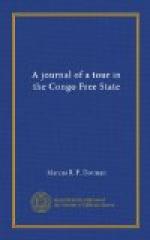On July 8th we arrive at Sekondi, Gold Coast Colony. The town from the sea seems to consist of white houses and huts with the usual red roofs. On a hillock near the shore is an old Dutch fort now used as a signalling station, and on the left, half way up a hill, an hotel has been built. The place is not very pretty or attractive-looking for there is not much colour and no mountains are visible. We anchor some distance from the beach and several open boats at once put off. These are each propelled by ten or twelve natives, who sit on the sides of the boat and ply their paddles, lustily singing as they work together and with a will. The paddles are shaped somewhat like those of a Canadian canoe, except that the blade is star shaped. All the cargo is swung overboard into these boats or canoes as they are called, and the passengers are lowered in a kind of chair. As there is a heavy ground swell running, the canoes are bobbing up and down like corks alongside. The chair is suspended in mid air and lowered rapidly as the canoe washes up, while all hope that it and its occupant will descend at the right moment.
One of the passengers was an English officer, Captain Wheeler, with whom we had played many games of deck cricket on the voyage. First his regulation seventy cubic feet of baggage was lowered—an extraordinary amount, for no one without the aid of a slide rule and logarithms could possibly calculate it—and then he himself made the perilous descent—without a ducking. He would next have 240 miles of train journey to Coomassie and then a walk—or rather a journey in a hammock—for another 300 miles to his station.
We now travel parallel to the Gold Coast which looks hot and uninviting, for there are but few patches of green or trees until Cape Coast Castle is reached. Here is a fort which must have impressed natives and slave dealers greatly in the past, a few houses and an imposing looking church dotted in the red sand. The whole line of the Coast here, somewhat recalls the Atlantic sea board of Georgia, U.S.A. and the towns look as though they would be as hot as Aden at its best or rather worst.
After leaving the Gold Coast, our course is shaped across the Bight of Benin straight for the Congo. There is plenty of time therefore, to study the system of justice in the Congo. This, like everything else in the country, is essentially simple and practical. There is a Court of Premiere Instance at Boma and others called Territorial Courts at Matadi, Stanley Pool, East Kwango, The Equator, Bangalas, Aruwimi, Stanley Falls and Kassai[1]. In each Court is a Judge, an Officer of the Public Ministry and a Registrar, but in the Territorial Courts, the judge may assume the functions of all. These courts hear all civil cases, whether European or native, but the Court at Boma is alone competent to hear trials for capital offences, whether committed by soldiers or civilians. The Court of Appeal consists of the President, two




